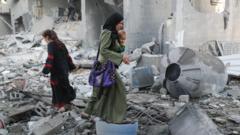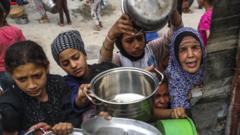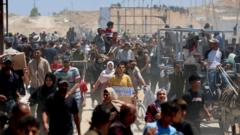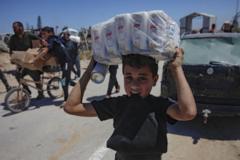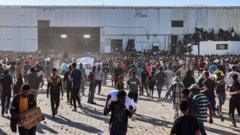The evacuation of al-Awda Hospital in North Gaza has left the governorate without any medical services, prompting urgent calls for the protection of civilians and healthcare amid ongoing military strikes.
North Gaza's Last Hospital Forced to Evacuate Amid Military Pressure
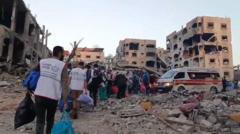
North Gaza's Last Hospital Forced to Evacuate Amid Military Pressure
Al-Awda Hospital in Jabalia ceases operations following an Israeli military evacuation order, leaving the region without healthcare facilities.
In a drastic development, the last operational hospital in North Gaza, al-Awda, was forced to evacuate its patients after the Israeli military issued an immediate order for evacuation. Dr. Mohammed Salha, the hospital's director, conveyed the emotional toll this evacuation has taken, highlighting the dire conditions after two weeks of siege. He lamented the lack of healthcare now available in the region, stating, "There is now no health facility working in the north."
While the Israeli Defense Forces (IDF) have yet to respond, the military's pressure on the hospital was palpable. Dr. Salha recounted threats from the occupation forces, prompting their decision to evacuate for the safety of patients and staff. Following extensive negotiations, patients were transferred to ambulances located far from the hospital, with many staff members carrying them over debris-laden paths as allied medical equipment remained behind due to impassable roads.
In the wake of the evacuation, international humanitarian organizations voiced their concerns. The World Health Organization (WHO) reported the hospital's closure severed a critical healthcare lifeline for local residents. WHO’s director-general urged for the protection of healthcare staff and patients, emphasizing that hospitals must remain free from military engagement.
The evacuation was part of a broader military operation, with the IDF declaring specific areas as dangerous zones due to ongoing conflicts with terrorist organizations. The hospital had reportedly been under siege for weeks, suffering extensive damage, including strikes to its emergency room.
As the situation intensifies, many panic-stricken civilians are now deterred from seeking medical care, with only a fraction of primary healthcare centers remaining functional. Reports indicate at least 72 fatalities in one day, while international pressure mounts on Israel to allow more humanitarian aid into Gaza.
Aid distribution has faced severe disruptions due to a blockade, with concerns raised about the famine risk for Gaza's 2.1 million residents. The UN and multiple aid organizations have issued warnings of “forced starvation,” and calls for a more assertive response to the humanitarian crisis continue to grow.
Israel’s operations in response to perceived threats from Hamas have ignited further tension both locally and internationally. Calls for a ceasefire, better humanitarian conditions, and comprehensive support for those affected remain urgent as the conflict shows no sign of abating.
While the Israeli Defense Forces (IDF) have yet to respond, the military's pressure on the hospital was palpable. Dr. Salha recounted threats from the occupation forces, prompting their decision to evacuate for the safety of patients and staff. Following extensive negotiations, patients were transferred to ambulances located far from the hospital, with many staff members carrying them over debris-laden paths as allied medical equipment remained behind due to impassable roads.
In the wake of the evacuation, international humanitarian organizations voiced their concerns. The World Health Organization (WHO) reported the hospital's closure severed a critical healthcare lifeline for local residents. WHO’s director-general urged for the protection of healthcare staff and patients, emphasizing that hospitals must remain free from military engagement.
The evacuation was part of a broader military operation, with the IDF declaring specific areas as dangerous zones due to ongoing conflicts with terrorist organizations. The hospital had reportedly been under siege for weeks, suffering extensive damage, including strikes to its emergency room.
As the situation intensifies, many panic-stricken civilians are now deterred from seeking medical care, with only a fraction of primary healthcare centers remaining functional. Reports indicate at least 72 fatalities in one day, while international pressure mounts on Israel to allow more humanitarian aid into Gaza.
Aid distribution has faced severe disruptions due to a blockade, with concerns raised about the famine risk for Gaza's 2.1 million residents. The UN and multiple aid organizations have issued warnings of “forced starvation,” and calls for a more assertive response to the humanitarian crisis continue to grow.
Israel’s operations in response to perceived threats from Hamas have ignited further tension both locally and internationally. Calls for a ceasefire, better humanitarian conditions, and comprehensive support for those affected remain urgent as the conflict shows no sign of abating.

